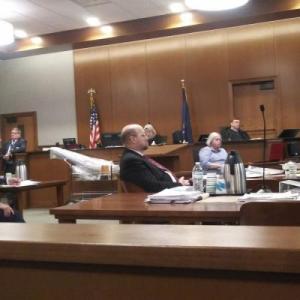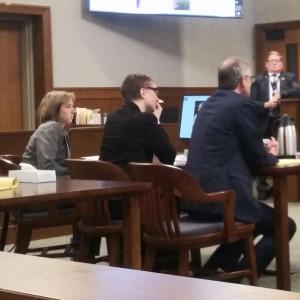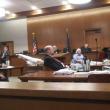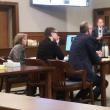Jurors hear closing arguments in trial of Sharon Carrillo; to begin deliberations tomorrow
 Assistant Attorney General Zainea (second from right) raises her hands while describing a photo of Sharon Carrillo and Marissa Kennedy to jurors during her closing argument. Sharon Carrillo’s attorney Laura Shaw is on the far left, with Sharon Carrillo sitting beside her, who in turn is sitting by attorney Chris MacLean.
(photo by Erica Thoms)
Assistant Attorney General Zainea (second from right) raises her hands while describing a photo of Sharon Carrillo and Marissa Kennedy to jurors during her closing argument. Sharon Carrillo’s attorney Laura Shaw is on the far left, with Sharon Carrillo sitting beside her, who in turn is sitting by attorney Chris MacLean.
(photo by Erica Thoms)
 Sharon Carrillo sits in between her defense attorneys. Laura Shaw in on Sharon’s left while Chris MacLean is on her right. All are watching Assistant Attorney General Leane Zainea deliver closing arguments for the State. (photo by Erica Thoms)
Sharon Carrillo sits in between her defense attorneys. Laura Shaw in on Sharon’s left while Chris MacLean is on her right. All are watching Assistant Attorney General Leane Zainea deliver closing arguments for the State. (photo by Erica Thoms)
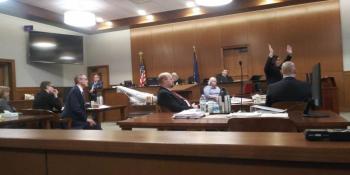 Assistant Attorney General Zainea (second from right) raises her hands while describing a photo of Sharon Carrillo and Marissa Kennedy to jurors during her closing argument. Sharon Carrillo’s attorney Laura Shaw is on the far left, with Sharon Carrillo sitting beside her, who in turn is sitting by attorney Chris MacLean.
(photo by Erica Thoms)
Assistant Attorney General Zainea (second from right) raises her hands while describing a photo of Sharon Carrillo and Marissa Kennedy to jurors during her closing argument. Sharon Carrillo’s attorney Laura Shaw is on the far left, with Sharon Carrillo sitting beside her, who in turn is sitting by attorney Chris MacLean.
(photo by Erica Thoms)
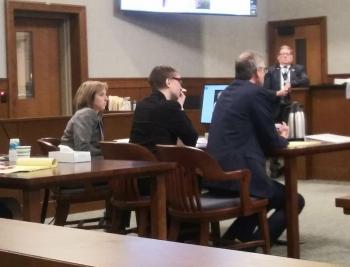 Sharon Carrillo sits in between her defense attorneys. Laura Shaw in on Sharon’s left while Chris MacLean is on her right. All are watching Assistant Attorney General Leane Zainea deliver closing arguments for the State. (photo by Erica Thoms)
Sharon Carrillo sits in between her defense attorneys. Laura Shaw in on Sharon’s left while Chris MacLean is on her right. All are watching Assistant Attorney General Leane Zainea deliver closing arguments for the State. (photo by Erica Thoms)
BELFAST — News media filled the courtroom during the afternoon session of day eight of the trial against Sharon Carrillo, with reporters anticipating closing arguments.
While the trial typically resumes at 1 p.m. each day, reporters and observers were still waiting for Justice Murray to reappear around 2 p.m.
Sharon Carrillo was crying when she entered the courtroom at 2:10 p.m., and sat with her hands clasped in front of her mouth, elbows resting on the desk.
After the jury reentered the courtroom, the defense officially rested its case and the closing arguments to the jury began, with prosecutors first at the podium.
“It feels like I’m dying,” Assistant Attorney General Leane Zainea said, commencing her closing argument, echoing the words spoken by Marissa Kennedy to her mother Sharon just days before she died.
“Days before her death, this little girl knew she was dying and so did her mother, the defendant, in this case, Sharon Carrillo because her daughter Marissa told her so. Did her mother get her help? Did her mother run to the neighbors, the Capanos, to ask for assistance? Did her mother tell Joe Kennedy when they spoke the morning of Marissa’s death, to call 911? No. Instead, she beat Marissa because she and Julio Carrillo believed that Marissa was faking. But Marissa was far from faking. In the days after she uttered that she felt like she was dying, Marissa’s speech became slurred and she was no longer able to walk. After months of constant and perpetual assaults that caused fear and that rush of adrenaline, Marissa’s heart could no longer take it, and she died on February 25, 2018,” Zainea told jurors at the start of her statement.
As she continued, Zainea said she heard Sharon’s attorney Chris MacLean wonder why the autopsy photos needed to be included, something MacLean attempted to have suppressed from the trial.
“[There are] actually two reasons why it was necessary to painstakingly go through the injuries that Marissa sustained,” she said. “First, because the court will instruct you that the State must prove each and every element of the charge of depraved indifference murder beyond a reasonable doubt. So what does that mean? Depraved indifference murder, where a person’s conduct manifests a depraved indifference to the value of human life, if it creates a very high degree of risk of serious bodily injury and that when objectively view any reasonable,” Zainea repeated this phrase twice, “any reasonable and prudent person would consider that conduct as depraved; meaning conduct that is particularly outrageous, revolting, savage, brutal, or shocking, and as you consider that fact, be advised that the State does not have to prove that the person was actually aware of the high death producing potential inherent in the conduct so long as a reasonable person would have been so aware.”
“There is no doubt, there can be no doubt, that anyone living in that household over at Harbor View Drive in Stockton Springs, there is no doubt that they had to have known that Marissa’s death was near.”
Zainea pointed out that Marissa had stopped being able to walk and speak in the days prior to her death, and yet nothing was done to help her.
“Marissa’s mom, the defendant, in this case, knew in the days before Marissa died that Marissa could no longer speak without slurring her words. Her mother knew that she was slipping in and out of consciousness. She knew that Marissa could no longer walk down to the basement on her own,” Zainea said.
Zainea also pointed to the Carrillo’s actions during the Feb. 23, 2018, visit from social worker Sue Webber, two days prior to Marissa’s death as further evidence against Sharon.
“[Sharon] knew that she and Julio had to get Marissa downstairs before that Friday meeting with Sue Webber to avoid raising suspicions. And those photographs, introduced by the defendant, that were taken just the day before Marissa died, captured exactly what her mother saw before Marissa died. A vacant look in her eyes, bruising to Marissa’s face, torso, legs, and arms. Open sores on her knees and on the top of her feet,” Zainea said.
Sharon wept audibly as Zainea went over the abuse suffered by Marissa, sometimes hunching forward to wipe her eyes. She was comforted periodically by her attorney Chris MacLean.
Zainea continued discussing the importance of the testimony of Dr. Flomenbaum.
“Dr. Flomenbaum, the chief medical examiner for the state, conducted an autopsy on Feb. 26, 2018, just one day after Marissa’s battered and bruised body was found by Vern Thompson, Denise Harriman, and Corporal Darrin Moody of the Waldo County Sheriff’s Department. And during the autopsy, [Dr. Flomenbaum] found three old healing rib fractures located in the lower back area, which were consistent with compression. [He found] bruising to Marissa’s ear that was consistent with the tweaking of that year, [he found] multiple old and new contusions to her head with recent bleeding and swelling of her brain. A lacerated liver with blood pooling in her abdominal cavity. Open wounds to the knees and top of her feet that were infected because her immune system was so, so compromised. Hair loss, a marker for constant adrenaline dumps that ultimately led [Marissa’s] thymus to stop producing that adrenaline, and 40-50 blunt force injuries covering her body,” Zainea told jurors.
During the autopsy, Dr. Flomenbaum found three to four patterned injuries on Marissa’s torso and above the left knee that were consistent with a belt buckle, and that’s the second reason why the State presented the testimony of Dr. Flomenbaum. In addition to determining the cause of death, those pattern injuries that he observed during the autopsy shed light on who caused those injuries, or who aided another in causing those injuries.
Zainea ended her closing arguments by telling the jury that even if Sharon was a victim of domestic violence, “she had ample opportunity to protect her daughter instead of aiding and facilitating her death by perpetuating a false story that was conveyed to others that her daughter was involved in harming herself.
“ In the months prior to Marissa’s death, she met with Sue Webber, and she met with Sue Webber alone, no disclosure of abuse to Marissa, no disclosure when directly asked if she was being abused. On several occasions she went to the Capano residence, remember they lived in condo 10… she went there to borrow money, or Christmas wrapping paper, and she never mentioned that Marissa was being abused.
“While living in Bangor she met with school staff, Dr. Barrett and Shannon Meadows of DHHS and she never disclosed abuse towards Marissa. For months Sharon Carrillo said nothing about the abuse that Marissa endured and on the very morning of Marissa’s death, when she couldn’t speak anymore, when she couldn’t walk anymore, Sharon Carrillo said nothing to her father. You will recall during the interview that Miss Carrillo acknowledged that she spoke to her father the morning of Marissa’s death and there was a conversation about the noise and what was going on.
“She had the opportunity to tell the man who had cared for Marissa for years, about Marissa’s condition, but she chose to remain silent and actively cover up what had in fact caused Marissa’s death. She was a mother, not afraid of Julio, but a mother who was afraid she was going to get in trouble for what she had done. Because she knew, just like she told the detectives, and just like she showed them, that she and Julio punished Marissa for being disrespectful for months.
“She said they would make Marissa kneel on the tile floor and then showed showed them how Marissa kneeled, hands clasped above her head. She said that she whipped Marissa with a belt and identified the areas of the body where she struck Marissa. She said that they would strike her in the face and the sides with her hands and with karate chops, just like she demonstrated during the reenactment.
“She said that Julio would kick Marissa, but she didn’t, she said that Julio would beat Marissa with a metal mop until the handle fell off. The mop that’s been admitted into evidence. She said that she punched Marissa and she said that the punishments got out of hand. She said at the end Marissa couldn’t walk and she was slurring her speech but Sharon thought she was faking so she beat her again. She said that she knew that Marissa needed to go to the hospital but they didn’t take her there because they were afraid they would get in trouble. She said that she and Julio came up with the story about Marissa hurting herself in the basement because she was afraid they would get in trouble.
“A wise friend once shared with me a quote from Maya Angelou, and that quote has resonated throughout this trial. The quote attributed to Maya Angelou goes like this: When someone shows you who they are, believe them the first time. And when you think about that as it applies here, your common sense tells you that what Sharon Carrillo first told the detectives is who she is.
“She is the mother of Marissa Kennedy who routinely beat her daughter, along with Julio Carrillo, until Marissa’s heart gave out and you’ll find that what the defendant told the detectives back on Feb. 25, and then again told them on Feb. 26, is in fact what happened. That Sharon Carrillo is guilty of the depraved indifference murder of her daughter Marissa Kennedy.”
Zainea’s closing arguments to the jury lasted roughly 40 minutes, after which, Sharon’s attorney Chris MacLean took to the podium to address jurors with his closing argument.
“This trial is for Sharon Carrillo, but it’s also for Marissa Kennedy,” MacLean told jurors at the start of his remarks. “In a broader sense, it’s for all victims of domestic violence and child abuse. There is a story that is seldom heard in courtrooms in the State of Maine, or anywhere, and I’ll suggest to you that if you accept the premise that there was actually child abuse going on in the home, and you have to accept that premise, and if you accept the premise that there was domestic violence going on in the home, and the evidence compels you to accept that evidence, then all of the facts that the State has described to you, can be seen in a very different light, and the opposite conclusion can be drawn from the evidence,” MacLean said.
“Victims of domestic violence and victims of child abuse have the narratives of their own lives hijacked by abusers like Julio Carrillo. Their abusers create a narrative that they’re crazy, that they’re self-harming, that they’re out of control in the home, and when police officers come to the door after reports of terrible domestic violence happening in the home, the abuser says, “my daughter was having an awful tantrum, she was smashing her head against the wall,” or “my wife, she’s emotional, she’s got mental problems and I’m taking her to the hospital to get it treated and that’s why you’re hearing a commotion in the residence.” The abuser takes over the narrative of the victims’ lives and silences them, and that is what this case is about and I’m going to hammer on that point over, and over, and over,” MacLean told jurors.
MacLean said: “Abusers sometimes come across as charming. They certainly come across as believable to police officers, to treatment providers, even to detectives of the Maine State Police. Sometimes they come across as being sincerely concerned about the welfare of their victims, they take them to the hospital and explain how awful it is that their daughter is smashing their head against the wall, [or] holding a knife to her throat while sleepwalking, whatever that story was Julio came up with. They tell the treatment providers that Sharon Carrillo is harming herself and is just out of control throwing tantrums. What they do is tell lies that are all about manipulation and control to try to get others to believe that something very different is happening in the house than what actually happened, and that’s what was happening in the Carrillo household.”
“Once this narrative takes hold, that Marissa is crazy and Marissa is harming herself, and the narrative takes hold that Sharon Carrillo is crazy and has these mental illnesses. [Sharon] doesn’t have any mental illnesses. All of Sharon Carrillo’s mental illnesses were something concocted by Julio, the same goes for Marissa. Marissa didn’t have any mental illnesses. These were stories that were concocted and once those stories take hold when a victim tries to give a different version of events, tries to tell a true narrative about what was really happening, they’re confronted with the fact that the abuser is charming and believable and is a good man and is 100 percent honest.
“The narrative that’s created by the abuser has taken all the air out of the room and becomes the reality. Eventually, the victim, because they lost their voice, you know, Marissa actually lost her voice well before she died, because Julio Carrillo took her voice away. He took her voice away to the point that school officials would ask Marissa questions and she wouldn’t answer them, and when asked whether someone had told her not to talk, [Marissa] would meekly nod that someone had instructed her not to talk - well who in the world do you think it was that instructed Marissa not to talk?
“It’s the same person that she would look to, that Sharon would look to before she would answer questions in front of treatment providers, or in front of anyone. It’s the same person they had to get permission from before signing a release, and that’s Julio Carrillo because Julio Carrillo took their voices away and they couldn’t even speak. That’s both literal and figuratively, he took their voices away. They were silent. Every witness talked about how Sharon Carrillo was walking around with her head down with kind of a sad expression on her face. People described Marissa Kennedy in the exact same terms and the reason why they were silent, and the reason they couldn’t tell the world they were being abused by Julio Carrillo is that he is a monstrous abuser and he took their voices away. In fact, he took their identities away. Their personalities changed after coming in contact with Julio Carrillo…. Everything about them as a person, as a human being, was stolen from them by Julio Carrillo and that comes through all of the evidence you’ve heard over the last two weeks,” MacLean said.
At one point during his closing argument, MacLean showed jurors an enlarged image showing both Marissa and Sharon nude, kneeling on the kitchen floor with their arms raised above their heads. MacLean used this as a moment to drive home that Sharon was a victim of Julio and not a participant in the abuse against Marissa. In total, MacLean’s closing argument lasted over an hour.
MacLean said: “What Sharon Carrillo first told the detectives was that she hadn’t abused her daughter. She denied over and over and over that she had hit or kicked or used the mop or done any of those things, and it was only after being pressed, as I’ll talk about…. If you want to use Maya Angelou and take the first impression, the first impression she denied being involved and suggested they asked Julio what happened to [Marissa].
“Sharon Carrillo might be a terrible mother. She may be a person who should never have children of her own. She maybe is a person who the welfare of children should never be entrusted to, but none of that makes her guilty for murder, and she’s not on trial for all these other things, those other things are distractions — they don’t make her look like an admirable human being, but they also don’t make her out to be a murderer. Let me ask you one more thing, I’m going to… the State also has this accomplice liability theory… for the love of God ladies and gentlemen, does that look like an accomplice to you?”
MacLean said as he turned to look at a weeping Sharon Carrillo.
“I told you that I was going to return with my final words to you, to this notion of reasonable doubt, and that’s where we are right now. The State as I mentioned has the burden of proving all of the evidence of the crime beyond a reasonable doubt. Sharon doesn’t have to prove anything to you. And when there are reasonable doubts that are left in your minds, as there are many in this case, the State must dispel those doubts.
“Not one of those doubts, not two of them, but the State needs to dispel all of those doubts that remain in the minds of any one of you individually as you retire into that jury room. All of those doubts need to somehow disappear from your minds before you can find Sharon Carrillo guilty of murder.
“And now I want to share with you, what I consider to be the most important thing I can say to a jury in a Maine court room, and the thing that I personally feel is fundamental to law and democracy itself, and that’s that under our system of law, each one of you, individually, as you sit there, is vested with the power to say “no” if one single doubt remains in your mind. If one single doubt crosses remains in your mind when you cross the threshold into that jury deliberation room, you have the right and the responsibility and the duty to have the courage to say ‘no,’ that the State has not proved beyond a reasonable doubt that Sharon Carrillo is guilty of murder and you must find her not guilty. Thank you.”
Prosecutors had the chance to make a rebuttal to MacLean’s statements, which AAG Zainea used in part to show jurors other photos recovered from the phones taken from the Carrillo home. In those photos Sharon can be seen smiling, and her legs and arms are visible in some and do not show any bruises or abrasions.
With closing arguments taking the trial beyond 4:30 p.m. when the Waldo County Judicial Center officially closes, Justice Murphy chose to wait to give jurors instructions on their deliberations until the following day. Murphy said the instructions would take roughly 35 minutes to explain, and that he will do so at the start of court Wednesday, Dec. 18, at 9 a.m.
Following Justice Murray’s instructions, jurors will retire to consider the evidence presented to them. They are allowed to ask for any piece of evidence for review during their deliberations.
It will be the first time since the trial began Dec. 6 that jurors will be allowed to discuss the case amongst themselves. Since the trial began jurors have been instructed not to discuss the trial with anyone, and to stay away from any media coverage of the trial.
The trial against Sharon Carrillo resumes Dec. 18 at 9 a.m.
Erica Thoms can be reached at news@penbaypilot.com
Event Date
Address
United States

